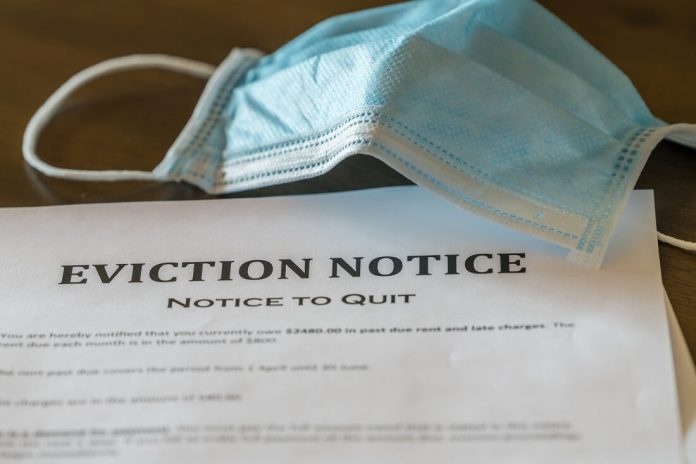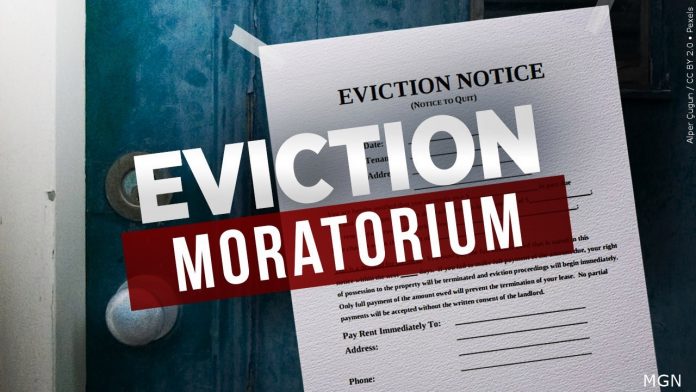Being a landlord is never easy, but the coronavirus pandemic has made the situation tougher. The national eviction moratorium has been extended several times, and many states have passed their own versions.
Many landlords haven’t received rent payments for more than a year and are delinquent on their mortgages. In the wake of COVID-19, landlord-tenant laws are shifting – and they’re not altering in favor of landlords.
In short, it’s become tougher than ever to be a landlord over the past year. If you own rental property, here are at least four potential problems you may run into during the pandemic.
Here’s what you can do about them.
1. Not knowing current federal and state eviction laws

The original eviction moratorium in the U.S. (the CARES Act) was enacted in March 2024 and extended through January 31, 2024. After that, the Centers for Disease Control (CDC) issued a new nationwide moratorium set to expire at the end of March 2024.
The deadline has been extended several more times, with the current extension set to expire October 3, 2024. During these eviction moratoriums, evictions for non-payment of rent have been illegal if the financial hardship was caused by the pandemic.
However, there have been other stipulations. For instance, landlords couldn’t raise the rent, charge late fees, or issue no-cause notices to vacate.
On top of the national blockage of evictions, some individual states enacted their own eviction moratoria, some of them with stricter regulations than the CDC. These layers of new laws make it harder to know what’s legal and what isn’t.
Some state Supreme Court rulings have made the regulations even more difficult to discern, let alone to follow. For example, a Texas Supreme Court ruled the federal moratorium unconstitutional. Since then, local landlords have been filing eviction lawsuits and some have been successful.
Texas courts are ignoring the national moratorium because of the state court’s ruling, and landlords probably won’t get in trouble. However, since the Texas Supreme Court didn’t issue an injunction, landlords outside of Texas can still get in trouble if they try to evict protected tenants.
How to handle shifting landlord-tenant laws

If you don’t have time to scour the news every day to track the changes in landlord-tenant law, you need a property manager. Property managers help landlords become successful property investors.
The Green Residential team in Houston, Texas, for example, takes over such duties as tenant screening, emergency calls, rent collection, maintenance, and repairs. They’ll even market and fill vacancies.
A professional property management company will already retain a qualified attorney it may consult with regard to ever-changing laws. They’ll know what’s legal and what isn’t, and will consult with the attorney before filing an eviction lawsuit on your behalf.
2. Disgruntled tenants

Landlord-tenant relationships can be naturally difficult, and disgruntled tenants are not uncommon. Even when you’re a good landlord and make the effort to communicate honestly and respectfully with your tenants, you might still end up with an upset tenant on your hands.
During the pandemic, tenants have been extra-sensitive to changes like new rules and rent increases. Renters who haven’t been able to find a job are more likely to overreact to small changes even if they seem reasonable.
Disgruntled tenants can pose a threat to your property if they feel backed into a corner. If a tenant can’t pay rent and you start to process an eviction in violation of the moratorium, you can bet the tenant will be upset.
If and when the person or family eventually leaves, you might discover damage to your property.
How to handle disgruntled tenants

If you encounter an upset tenant, take a deep breath and don’t respond out of frustration or anger. Don’t react within the moment.
Wait until you have time to process what they’ve said or done and formulate a strategic response. If the situation requires immediate action, take those steps quickly and provide all the notices you’re legally required to make.
You may not be able to mitigate all potential problems, but you can limit interactions that might push someone over the edge. Communicate only when necessary and make your communications professional, clear, and brief.
3. Pushback for filing a legal eviction

Some tenants mistakenly believe the eviction moratorium is a blanket ban on all evictions, regardless of the circumstances. That’s not true, though.
The national and statewide eviction moratoriums don’t protect all renters from getting evicted under any circumstances. If tenants have violated the lease agreement, become a danger, or has created a major hazard or nuisance, they can be legally evicted from your property.
If you file a legitimate eviction lawsuit, your tenant might not take it seriously. Or they might get upset and take out their anger against you or your property, under the assumption you’re in the wrong for trying to evict them.
How to handle pushback for filing a legal eviction lawsuit
First, make sure your eviction is completely legal by consulting with a lawyer. Next, don’t respond to the tenant when they’re in a combative state.
Don’t reach out to an angry tenant unless you have to supply an official notice or a response to a request. If they reach out to you, respond only to civil communications on matters you’re required to respond to by law.
Ignore all nasty emails, harassment, and insults. Avoid text messages, phone calls, and emails, and require all correspondence to be made through a physical letter mailed to your house. Limit your engagement to make sure you don’t accidentally give the tenant something that can be used against you.
Finally, don’t be afraid to pursue an eviction when it’s legal. The sooner you can get a problem tenant out of your unit, the sooner you can rent it to a better person.
4. Not having the funds to make necessary repairs

Landlords are required to maintain all rental units in good repair and up to specific safety standards. If you’re behind on your mortgage because your tenant stopped paying rent, however, being able to make those repairs may be onerous.
Unfortunately, you can’t withhold repairs because a tenant hasn’t paid the rent. Even when you’re not getting compensated, you are still legally required to make all necessary repairs.
How to handle repairs you can’t afford
Assess the job to determine whether it’s utterly necessary. If it’s not a necessary repair, let the tenant know.
Also, verify if the repair is indeed your responsibility. For example, if your tenant’s refrigerator breaks, you might not be responsible for fixing it or certain other appliances.
If you have a clause in the lease that says appliances are the tenant’s responsibility, you don’t have to fix or replace a broken refrigerator. It will be inconvenient to the tenant, but if you’re not getting rent and having to pay for repairs out of pocket, you should hold them to their lease agreement.
Always talk to an attorney before taking action against a tenant

These are just some of the possible situations you might encounter during the COVID-19 pandemic. We hope you won’t have to evict anyone, but if you do, make sure you talk to an attorney before filing a lawsuit.
Do everything by the book to protect yourself from losing your suit and getting counter-sued by your tenant.









